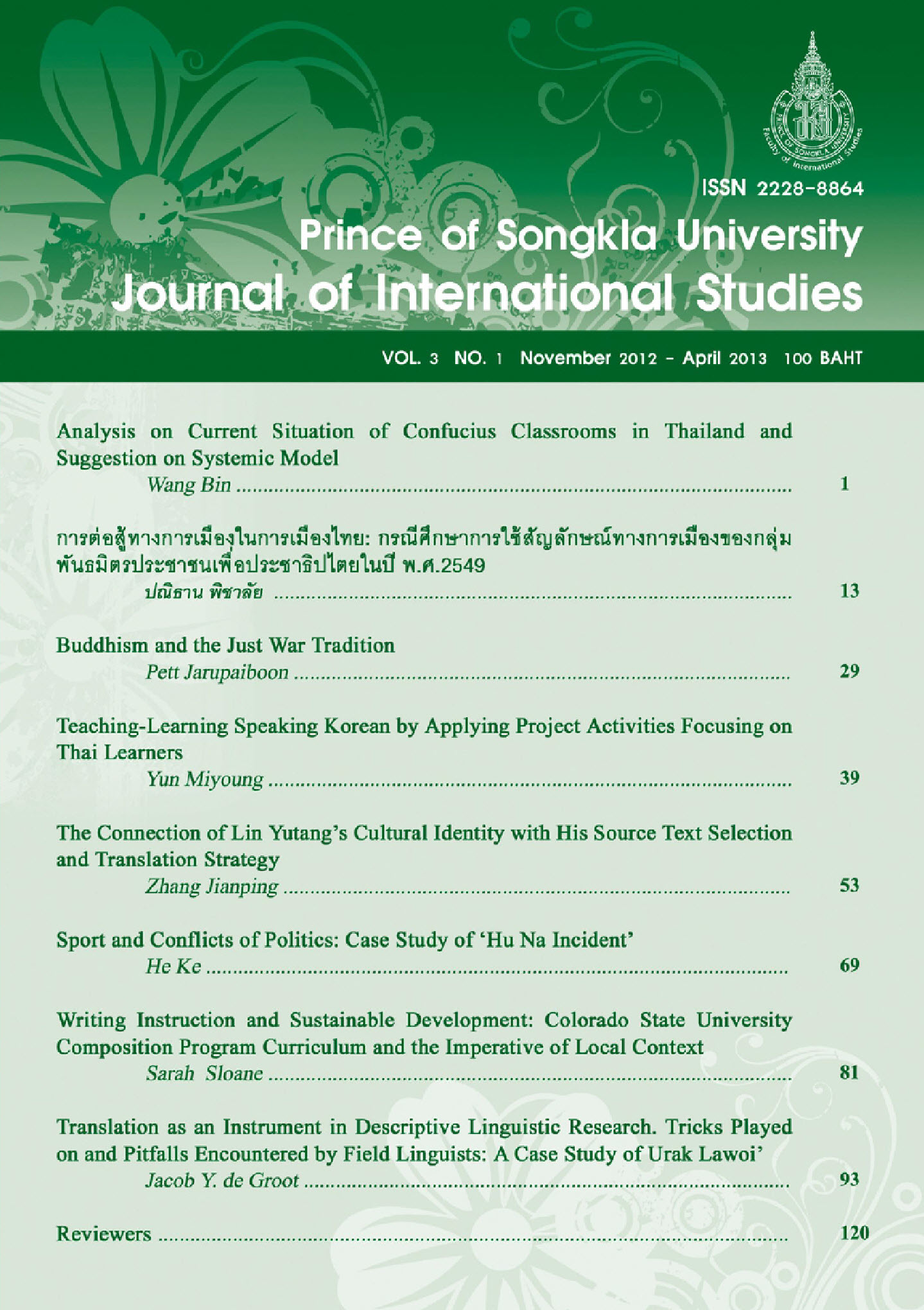Teaching-Learning Speaking Korean by Applying Project Activities Focusing on Thai Learners
Main Article Content
Abstract
"Learner-centered Education" is a contrasting method from the teacher-centered education, as it focuses on learners' demands and goals by using techniques such as giving part of authority to learners which allows them to choose their own goals of learning. In this article, to be based on the learner-centered education, and reflected communicative language teaching and theory of constructivism, the researcher would like to suggest the method of teaching-learning speaking Korean by applying project activities. Project activities is a teaching method that learners are the centre ofthe learning process. Moreover, during performing tasks, learners can be motivated and gain self-confidence, of which helps to reduce mental anxiety, a barrier to language learning.
Article Details
Statements and opinions expressed in articles herein are those of the authors and do not necessarily reflect the position of the editors or publisher.
Article, information, text, image, etc. which are published in Journal of International Studies, belong to Journal of International Studies. If anybody or any organization would like to use part or whole of them, they must receive written permission from Journal of International Studies before usage.
References
Brown, H. Douglas.(1994). Teaching by principles. Prentice Hall Ins. Brown, H. Douglas.(1994). Principles of language learning and teaching. Prentice
Hall Ins. Fride-Booth, D. (1992). Project Work with Advanced Class. ELT Journal. Vol. 36
Fride-Booth, D. (1996). Project Work. Oxford: Oxford University Press Han, Sangmi. Academic objective Korean speaking evaluation research. Korean Language Education. 20-1
Hedge, T.(1993). Key concept in EFL: Project work. ELT Journal. 47/3 Ji, Hyunsook.(2009). 'Alternate evaluation' on learners-centered Korean language education. Korean Language Education, 2004. 15.
Print. Jo, Soowee. (2008). Measure assignment-based Korean speaking, listening education. Korean Language Education as Foreign Language 30. Kang,
Seunghye.(2005). Korean High-Class Speaking Evaluation Tool Development Basic Research. Korean Education as a Foreign Language 30. Kang,
Inae.(1999). Epistemology of constructionism, constructionism and subject education.
Mun-Eum Sa. Kim, Jiyoung.(2007). Combination of report writing and presentation in Korean high-class level project learning research: target learners with academic as objective. Korean Education, 18-2. Kim, Hyunjin.(2006). Research on measure composition of project learning. Korean Education. 17-1
Kim, Hyunjin.(2006). Composition measure for Korean high-class level lesson that apply short fiction. Dual Language Education. No.34
Laffey, J. (1998). A computer-mediate support system for project-based learning educational technology research and development. p.46.
Lee, Haeyoung.(2000). Korean culture education through project activity. Foreign Languages Education. 7-2
Lee, Haeyoung.(2005). Principle and reality of evaluation for ability to understand Korean language. Korean Language Education. 16-3. Lee,
Mihye.(2001). High level lesson process through project work. Korean Education 12-2
Lee, Youngsik.(2004). Basic research for Korean language speaking test pattern and evaluation standard setting. Korean Language Education. 15-3 Nunan,
David. (1991). Language teaching methodology. Prentice Hall Ins
Park, Seonhee.(2006). Korean high-class level class project learning using English: Interaction based on writing group movie review, produce movie guide book, movie production project. Dual Language Education. No.30
Son, Jaeeun.(2009). Korean Education Project Learning Research applying Multimedia Dual Language Education. No.39
Won, Jinsook.(1992). Research for Korean Language Speaking Ability Evaluation Standard Setting. Korean Language Verbal Knowledge Education. 6
Yoo, Sukyoung.(2002). Project-based lesson for short-term KOorean language learning process. Korean Language Education. 13-1


